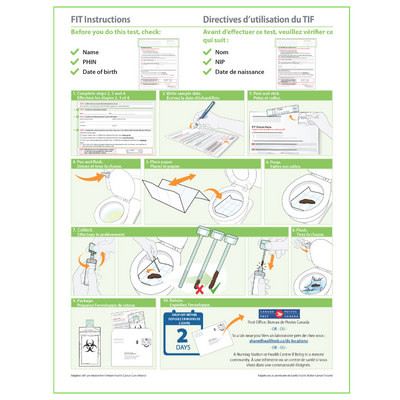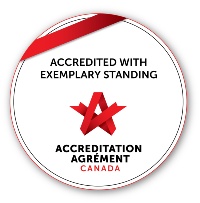ColonCheck
EN | FR
Colon Cancer
Colon cancer, also known as colorectal or bowel cancer, is one of the most commonly diagnosed cancers in Manitoba.
Age 50-74?
Most people between ages 50 and 74 should do a colon cancer screening test every 2 years.
Get a ColonCheck
The good news is that with regular cancer screening, colon cancer can be prevented.
Request a FIT today!
The colon is part of the body’s digestive system. It moves waste from the small intestine to the rectum.
Together the colon and the rectum make up the large intestine (bowel).
The small intestine absorbs most of the nutrients from your food and then passes the leftover waste to the colon. The colon absorbs water from the waste. What is left is called stool (feces or poop). When you have a bowel movement, the stool leaves the rectum through the anus.
Colon cancer, also known as colorectal or bowel cancer, is a disease where the cells of the colon grow out of control. It often starts from small growths (polyps) in the colon or rectum.
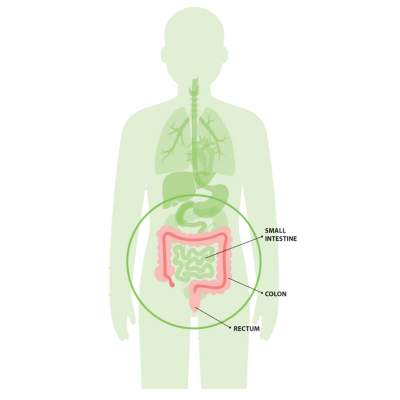
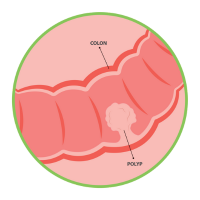
Polyps in the colon are common. You can have polyps for many years and not have any signs or symptoms. Most polyps do not turn into cancer. However, some polyps can grow and turn into cancer if they are not removed.
Most people are at average risk of colon cancer and should do a colon cancer screening test every 2 years. In Manitoba, the average risk colon cancer screening test is a fecal immunochemical test, or FIT.
Some people are at increased risk for colon cancer and may need to screened using a different test such called a colonoscopy. Factors you cannot change that can increase your risk for colon cancer include:
- Family history: parent, brother, sister, or a child diagnosed with colon cancer under the age of 60, or two more first degree relatives diagnosed at any age.
- Personal history: having colon cancer, high-risk polyps, familial adenomatous polyposis (FAP), Lynch syndrome, or inflammatory bowel disease (IBD) with associated colitis (irritable bowel syndrome (IBS) does not increase your risk for colon cancer.
Speak to your healthcare provider if you have any questions about whether FIT is the right test for you.
To reduce your risk of colon cancer:
Live smoke free
- Do not start smoking, quit smoking, and avoid second-hand smoke.
- Keep tobacco sacred. Do not smoke commercial tobacco.*
Avoid alcohol
- It is best not to drink alcohol. The less alcohol you drink, the more you reduce your risk.
Maintain a healthy weight
- Maintain a healthy weight within the healthy range.
Move more
- Be physically active for at least two and a half hours per week.
- Avoid sitting for more than six hours a day.
Eat well
- Eat plenty of fruits and vegetables, whole grains, beans and lentils.
- Limit fast foods, highly processed foods, sugar-sweetened drinks and red meat.
*Commercial tobacco smoke contains more than 7,000 chemicals, at least 250 of which are known to be harmful and over 70 can cause abnormal cell growth which can then become cancer. Traditional tobacco is unprocessed, natural tobacco gathered and used by some Indigenous peoples as a part of their cultures. Traditional tobacco is considered a sacred plant with immense healing and spiritual benefits in some Indigenous cultures, where it is used for rituals, ceremonies, and prayers. When commercial tobacco is used instead of traditional tobacco, it can be harmful.
Colon cancer screening is an important part of your healthcare routine. Most people age 50 to 74 should complete a FIT every two years.
FIT is a simple cancer screening test that you do in the privacy of your own bathroom. It is a safe and easy test that looks for hidden blood in poop. Blood may be a sign of polyps or cancer.
When doing the test, there are no dietary (food) or medication restrictions, so the test can be done at any time.
To complete the test, one sample of your poop is collected using a small swab and returned to the lab for analysis. After completing the test, it should be returned as soon as possible to ensure that the analysis is accurate.
A FIT can be accessed in several ways!
- ColonCheck automatically sends a FIT to all eligible Manitobans once they turn 50 years of age.
- Your healthcare provider can request a FIT be sent to you.
- You can also make an online request. No referral is needed.
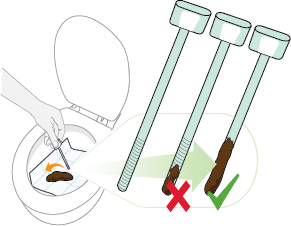
If you are unsure if FIT is the right cancer screening test for you, speak with your healthcare provider or contact ColonCheck.

FIT Instructions
Click here to open the instructions.
Reminder:
Be sure to peel off the FIT label and apply to your FIT before sealing the envelope.
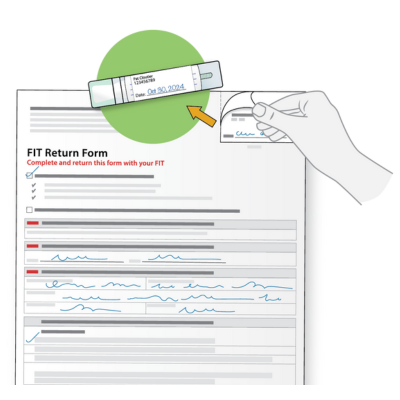
Drop-Off Locations
Drop off your completed FIT within 2 days to a location near you:
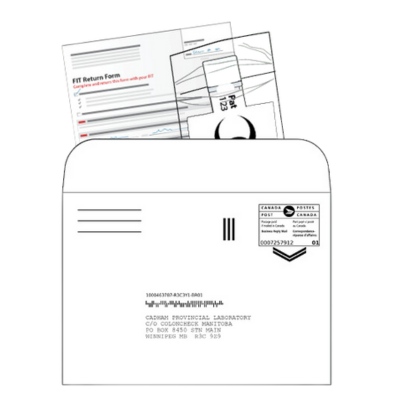
English
French
Cree
Ojibwe

It important to weigh the potential benefits and potential harms to make an informed decision before participating in colon cancer screening.
Potential Benefits
- Routine screening can find polyps or cancer in its early stages when treatment is most effective.
- FIT is safe, simple, and painless.
- FIT can be done in the privacy of your own home.
Potential Harms
- FIT can miss blood, which may result in a missed cancer diagnosis.
- Colonoscopy, the recommended follow-up test, is a safe procedure. But, as with any procedure, complications may occur including bleeding and reactions to medications used during the procedure. Rarely a perforation (tear) in the colon may occur requiring a hospital stay, and in very rare cases, may result in death.
Results
You can expect one of three test results with a FIT kit:
Normal
ColonCheck will send your FIT result by mail to you and your healthcare provider. If you are still eligible, ColonCheck will automatically send you another test in 2 years when you are due to complete your next test.
Abnormal
An abnormal result does not necessarily mean you have cancer. There are many possible reasons for blood in your stool. More testing will need to be done to see where the blood is coming from.
ColonCheck will contact you by phone to:
- tell you your result, and
- talk with you about the next test: a colonoscopy.
ColonCheck will send you and your healthcare provider a copy of your FIT result. Before you have your colonoscopy you will meet with the ColonCheck Nurse Practitioner in-person, virtually, or by phone to assess your ability to manage a colonoscopy and how to prep for the colonoscopy.
Unable to provide a result
The lab was not able to provide a result for the sample your mailed. There are many reasons for this. In all cases, ColonCheck will send you another FIT kit to complete.
Follow-Up Testing
A colonoscopy is the recommended follow up for abnormal FIT test result.
Repeating a colon cancer screening test after a positive result is not recommended. An abnormal positive result needs further investigation, regardless of the reason.
A colonoscopy allows the doctor to examine the inside of your colon (bowel) and rectum. A long flexible tube (colonoscope) with a small camera is passed into your rectum and colon. On a video monitor, the doctor looks for abnormal areas on the lining of your colon. There can be risks with this procedure. Rarely, some people may have bleeding or other complications such as a perforation (tear) in the colon that may require a hospital stay.
Resources:
- Colonoscopy (pdf)
- Bowel prep (pdf)
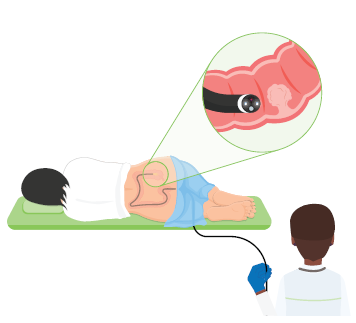
Risk History
I have a personal history of colon or abdominal/digestive cancer. Can I still do a FIT?
- A FIT is not the recommended test if you have had a previous diagnosis of cancer in your colon or digestive system. Speak with your healthcare provider to find out which test is right for you.
I have no family or personal history risk factors that would put me at an increased risk for colon or rectal cancer. I would prefer to have a colonoscopy instead of doing a FIT. Can I request a colonoscopy from my healthcare provider?
- To maximize the potential benefit and minimize the potential harm of colorectal cancer screening, it is best to use the right test, for the right person, at the right time.
The FIT is:
- suitable for people who have no signs or symptoms of colon or rectal cancer.
- suitable for people who have no factors that would put them at increased risk of colon or rectal cancer (e.g. first-degree family history of colorectal cancer).
- intended to be used as a screening tool for people who feel healthy and are age 50-74.
- a test that can detect bleeding in the colon and rectum.
- a test that can be done at home and has a lower risk of complications than colonoscopy.
Colonoscopy is used as a diagnostic tool for people who have:
- an abnormal FIT result and need further investigation.
- have signs/symptoms that require a scope to take a closer look at the inside of the colon and rectum.
Access the FIT
I was sent an FOBT, but I would prefer to do a FIT. Can I request a FIT instead?
- Contact ColonCheck and we will send you a replacement test kit.
I need a replacement test. Can I request another one?
- Yes, contact ColonCheck if your FIT has been lost or damaged. ColonCheck will mail you a new kit within two weeks.
Can I give this test to someone else living in Manitoba if I do not want to complete it (spouse, family, etc.)?
- No, ColonCheck sends out colon cancer screening tests to eligible Manitobans. The test must be completed by the person it is addressed to. If you do not wish to complete the test kit, you may return it unused in the return envelope it comes in. If you know someone who would like a colon cancer screening test, they can request a test by contacting ColonCheck.
Can I get a FIT kit from my healthcare provider (doctor, nurse practitioner)?
- Healthcare providers will not be handing out FIT kits at their clinic, but they can request a kit be sent to you at your home address. You can also request a FIT kit by contacting ColonCheck, CancerCare Manitoba at:
- www.cancercare.mb.ca/coloncheck, or
- by phone toll-free at 1-855-95-CHECK (1-855-952-4325). Interpreter services are available upon request.
What if I don’t have a healthcare provider?
- You can make a request through Manitoba Family Doctor Finder:
- https://www.gov.mb.ca/health/familydoctorfinder/
- 204-786-7111 (in Winnipeg)
- 1-866-690-8260 (toll-free)
- 744-8618 (TTY/TDD)
I am not a Manitoba resident. Can I still request a FIT from ColonCheck?
- Only Manitoba residents with a valid Manitoba Health Card can access the FIT.
Is this test mandatory?
- No, but it is important. Doing this test every two years could save your life. Regular colon cancer screening can prevent cancer by finding and removing polyps and pre-cancerous tissue before they turn into cancer. Most people age 50 to 74 should complete a FIT every 2 years. In 90% of cases, colorectal cancer can be cured if diagnosed at an early stage.
Prepare to do the FIT
Are there any dietary (food) or medication restrictions when doing the FIT?
- No, there are no food or medication restrictions needed for this test.
Does a FIT expire?
- To find the expiry date for your FIT, look at the label on your FIT for a black printed year, month, and date (e.g. 2024-05-02). If your FIT has expired before you are ready to complete it, you can request a replacement kit from ColonCheck:
- Online, or
- By phone at 1-855-95-CHECK (1-855-952-4325). Interpreter services are available upon request.
I am concerned about a persistent change in my bowel habits. Is FIT the right test for me?
- A FIT is a colon cancer screening test that looks for hidden blood in the stool as an early sign of colon cancer. If you are experiencing symptoms, make an appointment with your healthcare provider to discuss the right testing for you.
Can I do this test during my menstrual cycle?
- As FIT is a colon cancer screening test that looks for hidden blood in the stool as an early sign of colon cancer, it is best to wait until you have stopped menstruating/bleeding for 3 days before completing the FIT.
I am leaving the province in 3 months. Should I still complete this test?
- If you plan to return to Manitoba, complete the test. If you are moving outside of Manitoba permanently, it would be best to request a FIT from your new home.
Complete the FIT
Can I drop off my test or do I have to mail it back?
-
Within two days of completing the FIT, drop off the completed FIT kit and Return Form at a location near you. Click the links below to find a location. If you require assistance, contact ColonCheck.
Nursing Station or Health Centre if living in a remote community.
I have diarrhea (loose and watery stools). Can I collect a stool sample?
- Yes, it is okay to collect the sample if you have diarrhea.
I do not have a family doctor. Can I still complete this test?
- Yes, you may complete the test even if you do not have a family doctor. ColonCheck will help coordinate follow-up care if needed or recall you when you are due for screening.
I am worried that the single sample FIT is not as accurate as the six sample FOBT.
- Both the FIT and the FOBT are colorectal cancer screening tests. They both look for hidden blood in the stool as early sign of colon cancer. The FIT is a more sensitive test and looks specifically for human blood coming from the intestine. This is why you only need one sample, instead of six. The FIT test is 78% accurate at finding hidden blood in the stool.
After I do the FIT
I forgot to include my Return Form with my completed test. Will I have to redo the test?
- It is important to include your Return Form with your test kit. The lab will not be able to analyze your test without it. Contact ColonCheck at 1-855-95-CHECK immediately if you have forgotten to include it.
How do I store my sample if I cannot drop it off right away?
- Try to do your test as soon as possible after getting it in the mail. Take your sample at a time when you can drop it off in-person at the nearest Canada Post.
- Try to collect your stool (poop) sample at a time when you can drop it off in-person at the nearest Canada Post. If you cannot return your completed test right away, you can choose to keep it in the fridge for a short period of time (maximum of two days).
Can I contact the lab for my results?
- No, ColonCheck will contact you with your test result.
Symptoms of colon cancer may include:
- a persistent change in bowel habits,
- blood you can see in your stool, or
- persistent abdominal discomfort and bloating.
If you have any of the symptoms listed above, it does not necessarily mean you have colorectal cancer. It is important that you speak to your healthcare provider.
If you are unsure if FIT is the right cancer screening test for you, speak with your healthcare provider or contact ColonCheck. The FOBT test has been discontinued as of January 1, 2024. We invite you to request a replacement FIT kit online or by contacting ColonCheck.
Contact
1-855-95-CHECK (1-855-952-4325)
Interpreter services available upon request.
If you would like to promote any of our campaign videos, radio, and social media posts, email screening@cancercare.mb.ca.

